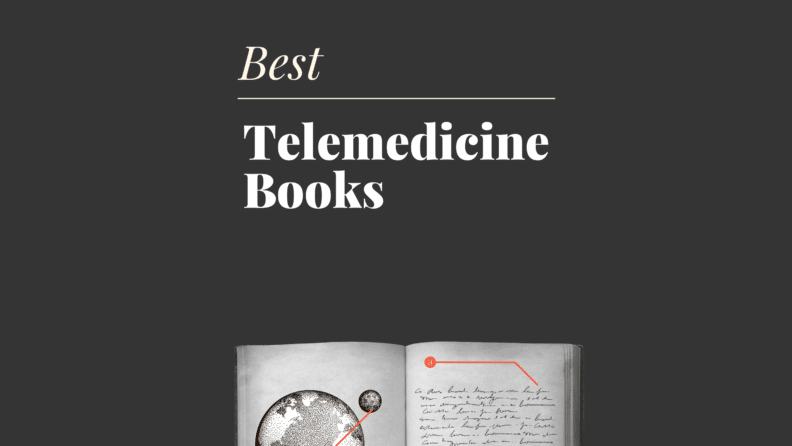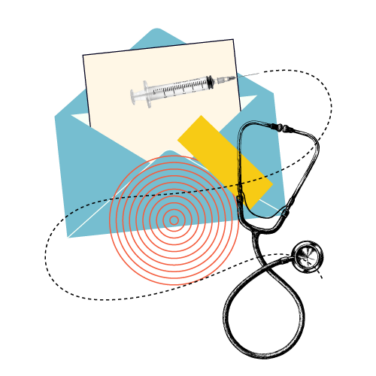As a medical practice owner engaged in telemedicine, I've benefited from telemedicine books. They're essential for clinicians and professionals seeking to enhance remote healthcare services, offering guidance on technology, reimbursement, and effective communication. These resources help keep my practice updated and can do the same for anyone looking to advance in telemedicine.
17 Best Telemedicine Books Shortlist
After thorough reading, I’ve chosen books that are most effective in addressing your needs in telemedicine.
- mHealth: Transforming Healthcare by Donna Malvey and Donna J. Slovensky
- Understanding Telehealth by Karen Schulder Rheuban and Elizabeth Krupinski
- Telepsychiatry and Health Technologies by Peter Yellowlees and Jay H. Shore
- Mobile Telemedicine: A Computing and Networking Perspective by Yang Xiao and Hui Chen
- Telemedicine: A Guide to Assessing Telecommunications for Health Care by Institute of Medicine
- The Role of Telehealth in an Evolving Health Care Environment by Institute of Medicine
- Introduction to Telemedicine, Second Edition by Richard Wootton, John Craig, and Victor Patterson
- Telemedicine Technologies: Information Technologies in Medicine and Telehealth by Bernard Fong, A.C.M. Fong, and C.K. Li
- Essentials of Telemedicine and Telecare by A.C. Norris
- Telemedicine for Trauma, Emergencies, and Disaster Management by Rifat Latifi
- Telemedicine and Telehealth: Principles, Policies, Performance, and Pitfalls by Adam William Darkins and Margaret Ann Cary
- Telemedicine: A Practical Guide for Professionals by Andrea L Kamenca MBA
- Introduction to Health Informatics by Christo El Morr
- Tele-oncology by Giovanna Gatti, Gabriella Pravettoni, and Fabio Capello
- Telehealth and Mobile Health by Halit Eren and John G. Webster
- Telemedicine in the 21st Century by Lucia Martinez and Carla Gomez
- The Telemedicine Handbook by Jane Preston
Integrate cutting-edge telehealth protocols by understanding the fundamentals of medical practice management.
Overviews Of The 17 Best Telemedicine Books
1. mHealth: Transforming Healthcare by Donna Malvey and Donna J. Slovensky
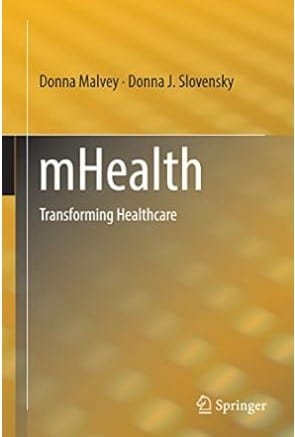
Summary:
"mHealth: Transforming Healthcare" explores the expansion of mobile health technology and its potential to impact healthcare delivery. The book delves into how mobile technologies are reshaping the way healthcare is accessed and delivered, providing insights into leveraging these technologies for optimal healthcare outcomes.
What You'll Learn:
Readers will gain a thorough understanding of the role of mobile health technology in modern healthcare, exploring its benefits, challenges, and applications. They will discover practical strategies to implement mHealth initiatives effectively and learn about the global impact of mobile health technology.
Why You Should Read It:
This book is essential for anyone looking to comprehend the transformative power of mobile technology in healthcare. It provides a comprehensive guide to understanding and leveraging mHealth to enhance healthcare delivery, making it a valuable resource for healthcare professionals, IT specialists, and anyone interested in health informatics.
Quote From The Book:
"mHealth technologies are more than just a way to communicate or a smartly packaged gadget; they represent a transformative technology that enables consumers to take charge of their own health."
About The Authors:
Donna Malvey and Donna J. Slovensky are renowned authors in the field of health informatics. For more insights and connections, you can reach out to Donna Malvey on LinkedIn.
2. Understanding Telehealth by Karen Schulder Rheuban and Elizabeth Krupinski
Summary:
"Understanding Telehealth" provides a comprehensive exploration of the multifaceted world of telehealth. The authors present an insightful look into how telehealth is revolutionizing the healthcare landscape, offering innovative solutions to deliver healthcare remotely.
What You'll Learn:
This book will equip readers with knowledge of the various applications and modalities of telehealth, focusing on its utilization to overcome geographical and logistical barriers to healthcare access. It provides an in-depth exploration of the legislative, regulatory, and financial landscape surrounding telehealth.
Why You Should Read It:
For individuals eager to grasp the intricacies of telehealth and its implications in enhancing healthcare accessibility and delivery, this book is a treasure trove of valuable insights. It serves as an authoritative guide for healthcare providers, policymakers, and health IT professionals.
Quote From The Book:
"The integration of telehealth into our health care delivery system is a critical imperative in driving transformational change."
About The Authors:
Karen Schulder Rheuban and Elizabeth Krupinski are leading voices in telehealth literature.
3. Telepsychiatry and Health Technologies by Peter Yellowlees and Jay H. Shore
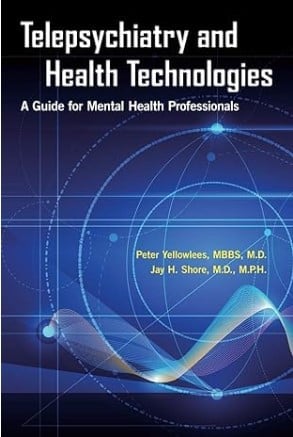
Summary:
This book is a pivotal guide exploring the interface of psychiatry and digital health technologies. It provides a thorough overview of telepsychiatry methodologies, emphasizing their role in enhancing the accessibility and quality of mental healthcare services.
What You'll Learn:
The readers will learn about the practical aspects and applications of telepsychiatry. The book sheds light on how technology can be leveraged to provide effective mental health services remotely, offering insights into the ethics, laws, and best practices related to telepsychiatry.
Why You Should Read It:
It’s an indispensable resource for mental health professionals eager to delve into the world of telepsychiatry. This book provides the tools and knowledge required to integrate digital health technologies effectively in psychiatric practice, enhancing service delivery to diverse populations.
Quote From The Book:
"Digital technologies are redefining the way mental health services are delivered, offering novel approaches to enhance patient care."
About The Authors:
Peter Yellowlees and Jay H. Shore are esteemed contributors to the realm of telepsychiatry. You can connect with Peter Yellowlees through his LinkedIn and Twitter and also on his personal website.
4. Mobile Telemedicine: A Computing and Networking Perspective by Yang Xiao and Hui Chen
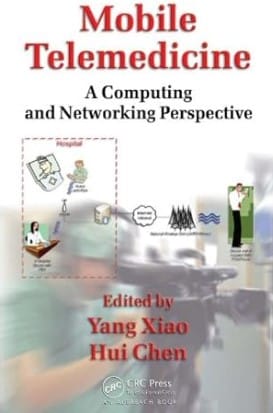
Summary:
This book delves deep into the computational and networking aspects of mobile telemedicine, providing an exhaustive exploration of the technologies that power mobile telemedicine applications and services. It offers a systematic review of the challenges and solutions in deploying telemedicine services on mobile platforms.
What You'll Learn:
This volume equips readers with a profound understanding of the design, architecture, and implementation of mobile telemedicine systems. It discusses various technologies such as wireless communication, mobile computing, and security that are crucial for the successful deployment and utilization of mobile telemedicine applications.
Why You Should Read It:
For IT professionals, healthcare providers, and telemedicine enthusiasts looking to understand the backbone of mobile telemedicine services, this book provides comprehensive insights. It is particularly beneficial for those aiming to design or implement efficient and secure mobile telemedicine systems.
Quote From The Book:
"Mobile telemedicine is shaping the future of healthcare, creating a convergence of computing, networking, and medical expertise."
About The Authors:
Yang Xiao and Hui Chen are respected authorities in the field of mobile telemedicine and networking.
5. Telemedicine: A Guide to Assessing Telecommunications for Health Care by the Institute of Medicine

Summary:
The book stands as a seminal guide in assessing telecommunications in healthcare. It meticulously explores the potentials and limitations of telemedicine, presenting a balanced viewpoint on the impact of telecommunications in shaping healthcare delivery systems.
What You'll Learn:
Readers will learn about the various dimensions of telemedicine including its historical evolution, the roles of different technologies in healthcare delivery, and the potential of telemedicine in improving healthcare access and quality.
Why You Should Read It:
If you are a healthcare provider, policymaker, or student of medical informatics seeking a comprehensive understanding of the telemedicine landscape, this book is an invaluable resource. It provides in-depth knowledge and balanced insights into telemedicine and its role in modern healthcare.
Quote From The Book:
"Telemedicine holds the promise to significantly alter the landscape of health care and improve health outcomes."
About The Author:
The Institute of Medicine is a recognized entity providing authoritative and comprehensive insights in the field of medicine.
6. The Role of Telehealth in an Evolving Health Care Environment by Institute of Medicine

Summary:
This book offers a concise summary of a pivotal workshop on the role of telehealth in modern healthcare. It provides insights into the evolving dynamics of the healthcare environment and discusses the implications, applications, and impact of telehealth in addressing healthcare challenges.
What You'll Learn:
Readers will be enlightened about the role of telehealth in addressing healthcare accessibility, quality, and affordability. It elucidates the potential of telehealth in transforming healthcare delivery and highlights discussions on policy, technology, and operational challenges and solutions.
Why You Should Read It:
This book is a treasure for anyone looking to delve into the discussions and deliberations on the significance of telehealth in contemporary healthcare. It is an essential read for healthcare professionals, administrators, and innovators eager to understand the role of telehealth in evolving healthcare paradigms.
Quote From The Book:
"Telehealth is a beacon of transformation in an evolving healthcare environment, bridging gaps and breaking barriers in healthcare delivery."
About The Author:
The Institute of Medicine, a leader in health and medical research, provides these insights.
7. Introduction to Telemedicine, Second Edition by Richard Wootton, John Craig, and Victor Patterson
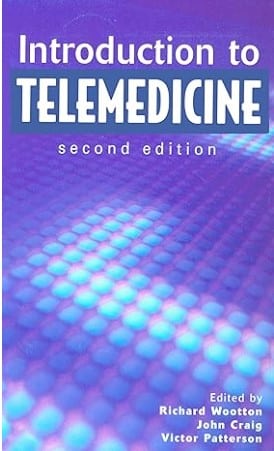
Summary:
"Introduction to Telemedicine, Second Edition" offers a comprehensive overview of telemedicine, discussing its evolution, current state, and future projections. The book combines theoretical concepts with practical application, making it a quintessential guide for those new to the subject.
What You'll Learn:
Readers will acquire a foundational understanding of telemedicine, including its methodologies, applications, and integration into modern healthcare systems. It also explores challenges, ethical considerations, and emerging trends in telemedicine.
Why You Should Read It:
This book serves as an essential resource for those seeking to grasp the fundamentals and intricacies of telemedicine. Whether you're a healthcare professional, a student, or an enthusiast, the blend of theory and application presented in this book will enhance your understanding of telemedicine.
Quote From The Book:
"Telemedicine is not merely a technological advancement; it's a transformative approach to modern healthcare delivery."
About The Author:
Richard Wootton, John Craig, and Victor Patterson are renowned experts in telemedicine.
8. Telemedicine Technologies: Information Technologies in Medicine and Telehealth by Bernard Fong, A.C.M. Fong, and C.K. Li
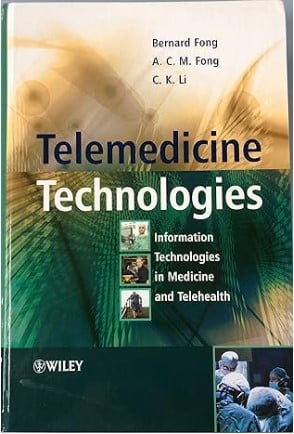
Summary:
This book delves into the innovative realm of telemedicine technologies, providing an in-depth exploration of information technologies in medicine and telehealth. It encompasses a range of topics from medical imaging to e-health and explores the technological advancements in telemedicine.
What You'll Learn:
Readers will gain insights into the various technologies that underpin telemedicine and telehealth, including medical imaging, bioinformatics, and e-health. The book provides a holistic view of the diverse technological aspects of telemedicine.
Why You Should Read It:
Anyone looking to understand the technological fabric of telemedicine will find this book invaluable. It offers a meticulous exploration of the myriad technologies that constitute the backbone of telemedicine and telehealth services.
Quote From The Book:
"Innovation and technology are the driving forces behind the evolution of telemedicine, propelling healthcare into a new era."
About The Authors:
Bernard Fong, A.C.M. Fong, and C.K. Li are esteemed contributors to the field of telemedicine technologies.
9. Essentials of Telemedicine and Telecare by A.C. Norris
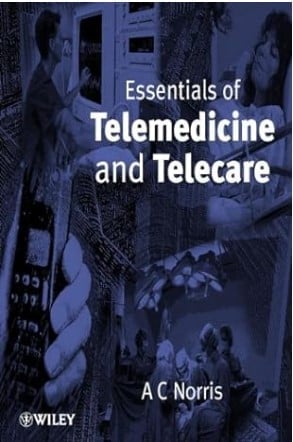
Summary:
"Essentials of Telemedicine and Telecare" provides a succinct yet comprehensive guide to the fundamental concepts and applications of telemedicine and telecare. This book seamlessly combines essential theories with practical aspects, offering a well-rounded view of the domain.
What You'll Learn:
The book imparts a thorough understanding of the essential concepts, applications, and advancements in telemedicine and telecare. It discusses the transformative impact of these technologies on healthcare delivery and patient care.
Why You Should Read It:
For those seeking to understand the essentials of telemedicine and telecare, this book serves as an indispensable guide. It offers clarity on the core concepts and practical applications, making it suitable for professionals and enthusiasts alike.
Quote From The Book:
"Telemedicine and telecare are the pillars of transformative healthcare, enabling access, efficiency, and quality care."
About The Author:
A.C. Norris is a respected authority in telemedicine and telecare.
10. Telemedicine for Trauma, Emergencies, and Disaster Management by Rifat Latifi
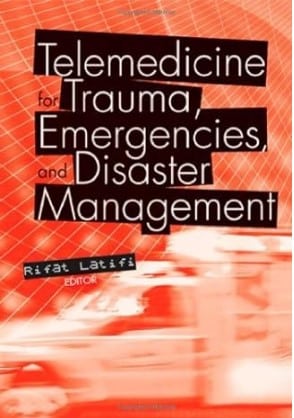
Summary:
This book is a comprehensive guide focusing on the implementation of telemedicine in areas such as trauma, emergencies, and disaster management. It combines evidence-based information with practical advice on integrating telemedicine in various emergency settings.
What You'll Learn:
You will delve into the strategies and practical implementations of telemedicine in emergency scenarios, gaining insights into how technology is transforming the management and delivery of emergency care and services in various settings.
Why You Should Read It:
If you're involved in emergency care or are interested in how telemedicine is reshaping emergency response and management, this book is a crucial read. It combines theoretical knowledge with practical applications, shedding light on the transformative impact of telemedicine in emergency care.
Quote From The Book:
"Telemedicine is redefining emergency response, bridging gaps, and bringing forth a new era of emergency and trauma care."
About The Author:
Rifat Latifi is a prominent expert in the field of telemedicine, especially in emergency and trauma care. For more information about his work and contributions, connect with Rifat Latifi on his LinkedIn.
11. Telemedicine and Telehealth: Principles, Policies, Performance, and Pitfalls by Adam William Darkins and Margaret Ann Cary
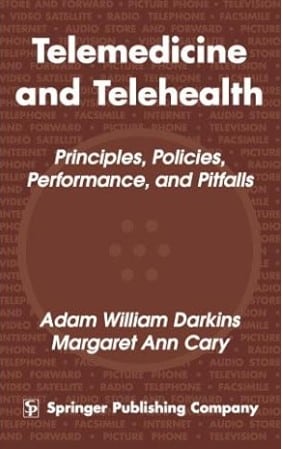
Summary:
This informative book offers an extensive look into the principles, policies, performance, and potential pitfalls of telemedicine and telehealth. It lays down the foundation and builds up with policy and performance aspects, helping professionals understand the scope and limitations of telehealth.
What You'll Learn:
The reader will gain a deep understanding of the underlying principles of telemedicine, the policies governing it, its performance aspects, and the potential challenges and pitfalls that professionals may encounter.
Why You Should Read It:
This book is essential for anyone looking to comprehend the multi-faceted world of telemedicine and telehealth, offering insights into its principles, practices, policies, and challenges, making it beneficial for both newcomers and seasoned professionals in the field.
Quote From The Book:
"Understanding the principles and policies of telemedicine is pivotal for its effective implementation and performance optimization."
About The Authors:
Adam William Darkins and Margaret Ann Cary are recognized authorities in telehealth and telemedicine.
12. Telemedicine: A Practical Guide for Professionals by Andrea L Kamenca MBA
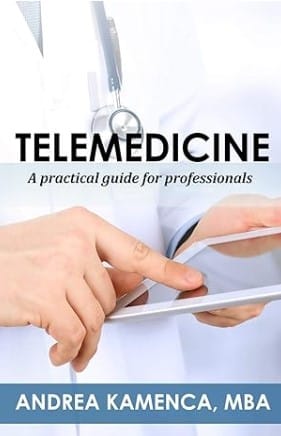
Summary:
Andrea L. Kamenca’s book serves as a practical guide for professionals interested in telemedicine. It provides a hands-on approach to understanding and implementing telemedicine in a professional setting, making it an invaluable resource for those in the healthcare sector.
What You'll Learn:
This guide will equip professionals with practical knowledge and strategies for implementing telemedicine, helping them navigate the challenges and leverage the opportunities that telemedicine brings to healthcare.
Why You Should Read It:
This practical guide is indispensable for healthcare professionals keen on understanding and adopting telemedicine in their practice. It provides actionable insights and practical strategies, enabling professionals to integrate telemedicine effectively.
Quote From The Book:
"The pragmatic integration of telemedicine is fundamental in advancing healthcare delivery and expanding access."
About The Author:
Andrea L Kamenca MBA is an expert in telemedicine with a focus on practical implementation. For more about her expertise and insights, connect with Andrea L. Kamenca on her LinkedIn.
13. Introduction to Health Informatics by Christo El Morr
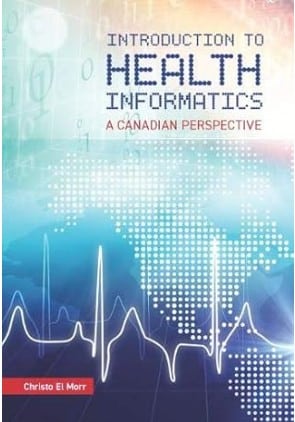
Summary:
This book provides an in-depth look at health informatics from a Canadian perspective. It outlines the essential concepts, methodologies, and applications relevant to health informatics, focusing on the Canadian healthcare system’s intricacies and unique aspects.
What You'll Learn:
Readers will learn the fundamental concepts of health informatics and how they are applied in the Canadian healthcare setting, acquiring knowledge on various technologies, methodologies, and applications in health informatics.
Why You Should Read It:
This book is invaluable for those who want to understand health informatics in the context of the Canadian healthcare system. It gives insights into how informatics impacts healthcare delivery and management, focusing on local challenges and solutions in Canada.
Quote From The Book:
"Informatics is pivotal in optimizing healthcare delivery and management, especially in the distinct landscape of Canadian healthcare."
About The Author:
Christo El Morr is a specialist in health informatics with a particular focus on the Canadian healthcare system. Connect with Christo El Morr through his LinkedIn.
14. Tele-oncology by Giovanna Gatti, Gabriella Pravettoni, and Fabio Capello
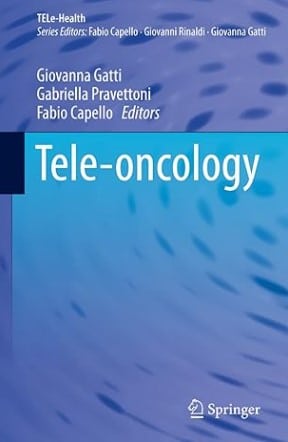
Summary:
“Tele-oncology” by Giovanna Gatti, Gabriella Pravettoni, and Fabio Capello is a groundbreaking book focusing on the application of telemedicine in oncology. It delves into how technology can enhance cancer care delivery and patient management.
What You'll Learn:
Readers will explore how telemedicine is shaping oncology, gaining insights into technological innovations and their applications in cancer care, and learning about the challenges and opportunities in implementing tele-oncology.
Why You Should Read It:
This book is essential for oncology and telemedicine enthusiasts wanting to explore how innovative technologies are transforming cancer care and addressing the associated challenges, providing a fresh perspective on patient-centered care in oncology.
Quote From The Book:
"Tele-oncology is at the frontier of revolutionizing cancer care and patient management through innovative technology."
About The Authors:
Giovanna Gatti, Gabriella Pravettoni, and Fabio Capello are pioneers in the field of tele-oncology.
15. Telehealth and Mobile Health by Halit Eren and John G. Webster
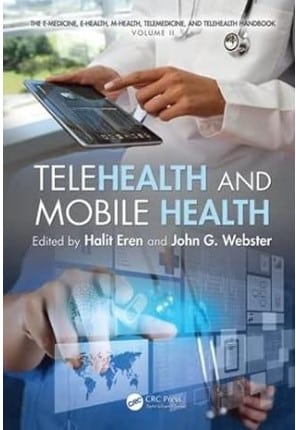
Summary:
“Telehealth and Mobile Health” is a comprehensive guide that explores the expansive world of telehealth and its applications in mobile health. It provides extensive knowledge on the integration and application of mobile technology in healthcare delivery.
What You'll Learn:
The book offers insights into the various technologies and platforms used in telehealth and mobile health, providing knowledge on how these technologies are integrated and utilized in healthcare delivery and management.
Why You Should Read It:
Anyone keen on learning about the intersection of telehealth and mobile technology in healthcare should read this book. It presents a detailed overview of the technologies and their applications, helping readers understand the transformative impact of mobile health on healthcare delivery.
Quote From The Book:
"Mobile health is reshaping healthcare delivery, leveraging technology to offer innovative solutions and optimize healthcare management."
About The Authors:
Halit Eren and John G. Webster are renowned experts in telehealth and mobile health.
16. Telemedicine in the 21st Century by Lucia Martinez and Carla Gomez
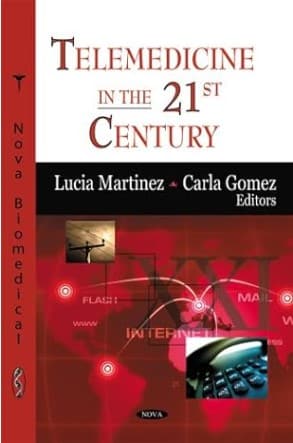
Summary:
This book offers a comprehensive overview of the evolution and state of telemedicine in the modern era. It provides readers with knowledge about the different technologies, methodologies, and applications of telemedicine in contemporary healthcare.
What You'll Learn:
Readers will gain insights into the development of telemedicine and its significant impact on healthcare delivery. The book elucidates the various technologies and their applications, providing a thorough understanding of telemedicine’s role in enhancing healthcare.
Why You Should Read It:
This book is a must-read for individuals looking to understand the pivotal role of telemedicine in shaping 21st-century healthcare. It provides extensive knowledge of telemedicine applications and methodologies, making it a valuable resource for healthcare professionals and enthusiasts.
Quote From The Book:
"Telemedicine stands as a transformative force in the 21st-century healthcare landscape, revolutionizing healthcare delivery through technology."
About The Authors:
Lucia Martinez and Carla Gomez are prominent figures in the field of telemedicine.
17. The Telemedicine Handbook by Jane Preston
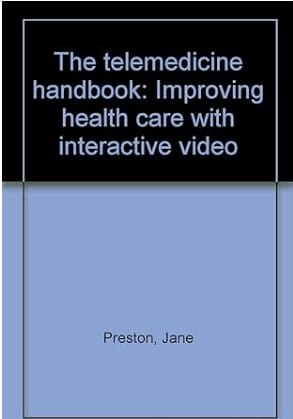
Summary:
Jane Preston’s “The Telemedicine Handbook: Improving Healthcare” is a meticulous guide on leveraging telemedicine to enhance healthcare services. The book serves as a manual, offering in-depth insights, practical advice, and knowledge on implementing telemedicine effectively.
What You'll Learn:
The handbook educates readers on the practical aspects of applying telemedicine to improve healthcare. It imparts knowledge of the operational, technical, and clinical facets of telemedicine, offering a holistic view of its implementation in healthcare settings.
Why You Should Read It:
Healthcare professionals and those interested in telemedicine will find this handbook invaluable in understanding how telemedicine can be effectively utilized to optimize healthcare services. It’s a well-rounded resource, offering practical insights and actionable knowledge on telemedicine.
Quote From The Book:
"Improving healthcare is at the core of telemedicine, utilizing technological advancements to optimize healthcare services and patient care."
About The Author:
Jane Preston is a reputed author and expert in telemedicine.
Which Telemedicine Books Do You Recommend?
I hope you find value in these insightful works on telemedicine. If there are noteworthy books on the subject that you believe should be included, feel free to suggest them. Your input is invaluable in enriching this list with diverse and comprehensive resources.
To stay updated on the latest trends, best practices, and solutions related to your medical practice, subscribe to The Medical Practice newsletter.


